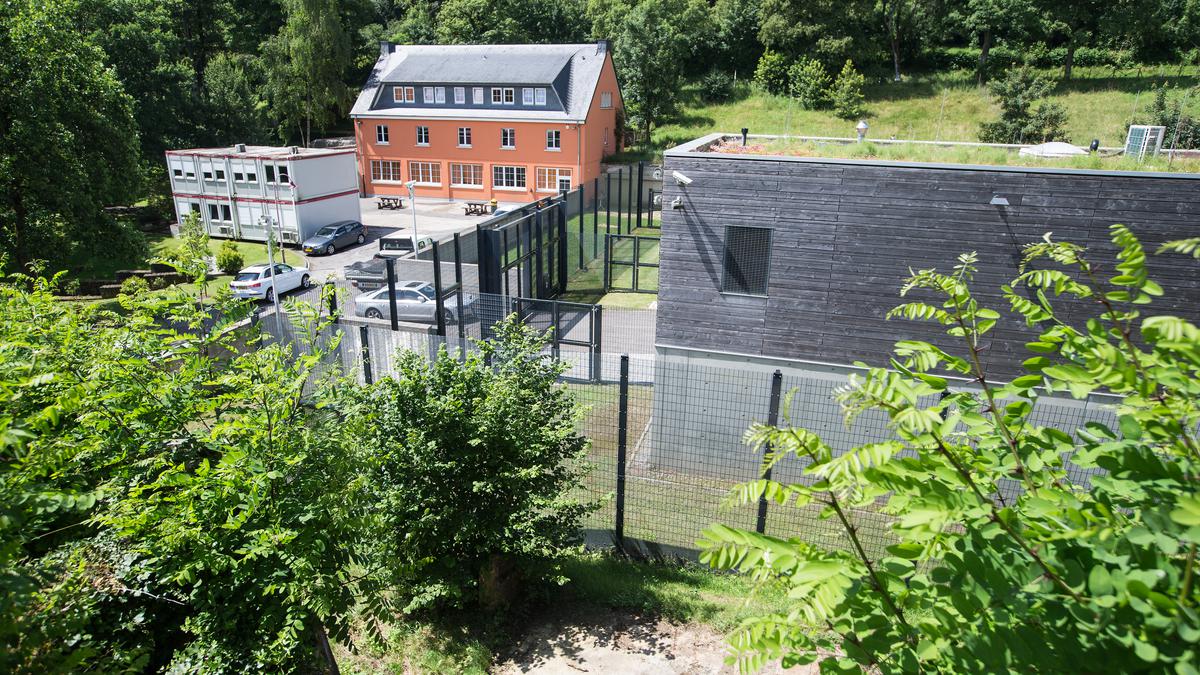The Unisec juvenile detention centre for minors in Dreiborn, long the subject of criticism over recurring violent incidents, has taken steps to improve conditions for both inmates and staff, according to both Luxembourg’s Ombudsman Claudia Monti and Charel Schmit, the Ombudsman for Children and Youth (Okaju).
A 2022 joint report by the Ombudsman and Okaju had uncovered numerous shortcomings at Drieborn, including organisational and structural inadequacies.
Ombudsman Claudia Monti said that staff at Dreiborn had noticeably improved communication both with each other and with the juvenile inmates © Photo credit: Gerry Huberty/LW-Archiv
“The approach they have now is not to wait for [an incident] to happen, but to see that none happens,” Monti said at a media briefing on Wednesday. A new strategy, focused on preventative measures rather than just being reactive, has significantly improved the mood among the staff.
Above all, communication with each other and with the juvenile inmates has improved noticeably, she said.
Clearly defined division of tasks
There is now a clearly defined division of tasks for carers, supervisors and security officers, which has helped to structure the working environment and has had a positive effect on the relationship staff have with the young offenders.
Even in crisis situations, fixed roles and procedures have now been defined for a total of 23 different processes. “We’ve made a lot of progress,” Monti stressed. Another important step in the right direction has been the improvement in medical care for inmates, she said.
Also read:Children held in unacceptable conditions in Luxembourg jails
Schmit explained that modern legislation, educational concepts and a user-orientated infrastructure are crucial for further progress.
While acknowledging that the infrastructure cannot be changed overnight, Schmit said that the current facility at Dreiborn is “absolutely” not fit for purpose for either the educational aspect of the centre’s aims nor for resocialisation efforts.
The concrete, steel and glass structure is not appropriate for the needs of children and young people, Schmit added.
Charel Schmit, the Ombudsman for children and youth © Photo credit: Gerry Huberty/LW-Archiv
While acknowledging that the infrastructure cannot be changed overnight, Schmit said that the current facility at Dreiborn is “absolutely” not fit for purpose for either the educational aspect of the centre’s aims nor for resocialisation efforts.
The concrete, steel and glass structure is not appropriate for the needs of children and young people, Schmit added.
Nevertheless, some progress has also been made, he said. Worn and broken furniture has been replaced, the rooms have been better protected against sunlight and the visitor rooms have been made more welcoming.
New house rules have also been drawn up together with the young people, which clearly define both rewards and sanctions and emphasise personal responsibility. The rewards now also include the possibility of structured free time.
Also read:EU takes Luxembourg to court over arrest of minors
However, while Unisec is to be commended for its efforts, Monti and Schmit also criticised aspects of the government’s strategy and existing legal framework for youth offenders.
A long overdue reform of the protection of minors and the introduction of a juvenile penal code are still a long way off.
“The deprivation of liberty must be the very last resort, when all other measures have effectively been eliminated,” Schmit argued. “It’s important not to forget that young people don’t find themselves in such a tight situation for no reason,” he added.
It’s important not to forget that young people don’t find themselves in such a tight situation for no reason
Charel Schmit
Okaju
Another problem is that under Luxembourg law, underage inmates at Unisec are not considered convicted offenders – and unlike adults, they are not eligible for parole and cannot appeal their sentence. There is also no basic support from a lawyer.
Clear legal regulations that meet international standards are therefore needed, Monti and Schmit said. The focus must be on alternative measures in order to offer young offenders a real future without imprisonment.
Also read:Two minors placed in adult prison until options open up
Psychiatric care and therapy options also need to be significantly expanded. “Don’t forget, many of the young people who are currently at Unisec already have a long history behind them,” said Monti.
The Ombudsman and Okaju are also sceptical about forcing inmates to wear uniforms. This does not exist in the adult prison system, but is mandatory in Unisec.
“We are neither a prison nor a boarding school,” Monti explained.
Clothing is an important means of expression, especially for young people. An appropriate diet also plays a far greater role for minors in a closed prison than it does for those on the outside.
However, Monti and Schmit disagree on one point. Monti called for political decision makers to review and re-evaluate the possibility of a voluntary closed option for young offenders.
Okaju, on the other hand, is in favour of waiting to see the effects of the current reform, collecting data and only then deciding on further measures.
(This article was first published by Luxemburger Wort. Translation and editing by Duncan Roberts)
